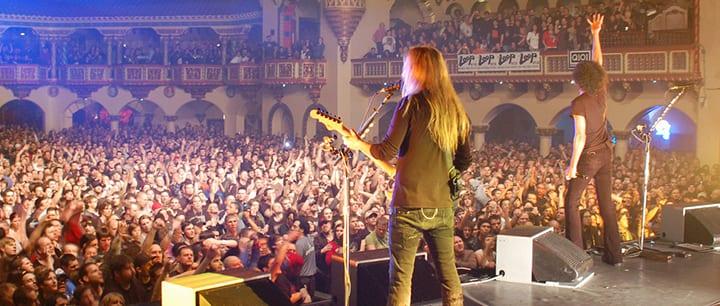 Gigging in the Chicago music scene is a milestone in any music career. It’s the third biggest city in America, and the most important music industry city in the Midwest. Getting exposure in the “Windy City” can be a stepping stone to national airplay, and many legendary artists have come from Chicago. The city has grown to be a force in the evolution of indie music, particularly with the Pitchfork Festival. The following information can be used as your guide to finding venues to play in Chicago.
Gigging in the Chicago music scene is a milestone in any music career. It’s the third biggest city in America, and the most important music industry city in the Midwest. Getting exposure in the “Windy City” can be a stepping stone to national airplay, and many legendary artists have come from Chicago. The city has grown to be a force in the evolution of indie music, particularly with the Pitchfork Festival. The following information can be used as your guide to finding venues to play in Chicago.
Learn Local Legends
Understanding the exciting history of the Chicago music scene is a good way to strike up conversations with club owners. For example, you might want to find out about the history of a venue to see if your sound fits.
Some of the top names to come from the greater Chicago area over the past several decades have been Chicago, Earth, Wind & Fire, The Smashing Pumpkins, Cheap Trick, Styx, R. Kelly, Kanye West, and Ministry. The city also has deep roots with blues artists such as Willie Dixon, Louis Armstrong, Muddy Waters, and Howlin’ Wolf.
Venues That Support Live Bands
Part of your research should also involve finding out about the nuances of various Chicago venues. The nicest venues, such as the Aragon Ballroom and Park West, are geared toward more established acts, while smaller venues and bars for up-and-coming bands include The Hideout and Schubas. Many big names came through these small clubs on their way to national attention, so they are a great place to start. Make a list of all the venues in Chicago and concentrate on pursuing the venues that best match your music. Visit them often, network with the people you meet, and ask for the names of the booking agents at each club.
Checklist for Gigging in Chicago
-
Make a demo recording of your live act
-
Create a press kit for club owners
-
Distribute press kits and demos with cover letters to club personnel
-
Follow-up with club contacts
-
Negotiate a deal
The keys to this checklists are the demo and the press kit. Make sure both are as professional as possible. In other words, make sure the demo sounds good enough to capture your best live performance ability. Studio recordings are even better, but let’s assume you are working your way up to quality recordings by doing gigs first. The demo can be low-fi as long as it sounds listenable and has energy!
Getting Local Attention
One of the best ways to help build a fan base is to get local media coverage. If you can get reviewed in any of the local publications it will help your cause dramatically. The Chicago Tribune and the Daily Herald, for example, reach a wide audience in Chicago. You can also try to get reviews in college-run publications, such as The Chicago Maroon. There are also several websites that track the local scene, such as ChicagoMusic.org, ChicagoMusicGuide.com, and WindyCityRock.net.
These local media outlets, as well as public radio stations, can be catalysts for the most important type of promotion of all: word of mouth. Reviews from print or digital publication can also become part of your press kit to show that your act is making the news.
Easiest Ways to Get Live Exposure
-
Play at open mic shows
-
Offer to play benefit shows, which can get media coverage
-
Rent out your own venue and promote it yourself
-
Become friends with venue owners
-
Piggyback gigs from friends
Getting Paid vs Free Shows
Everyone likes getting paid, especially while playing music and having fun! But bands usually have to pay their dues for a while by doing free shows before they earn money, even in the Chicago music scene. Concert promoters at big venues usually pay artists upfront, whereas small venue deals are done in a variety of ways. Bands that prove they can hold a crowd’s attention or attract a sizable draw may get paid upfront, or may be given a percentage of the door or bar sales.
Unknown, up-and-coming artists simply are not in demand, which is why they often don’t get paid, especially at small venues. But playing for free at small venues is how most musicians start out, and it’s a great opportunity to refine your talent and learn about crowd response and interaction. If your act creates demand in the Chicago music scene then you will likely get paid well. Good luck with your gigging!
Photo by Tony
Suzy S.

